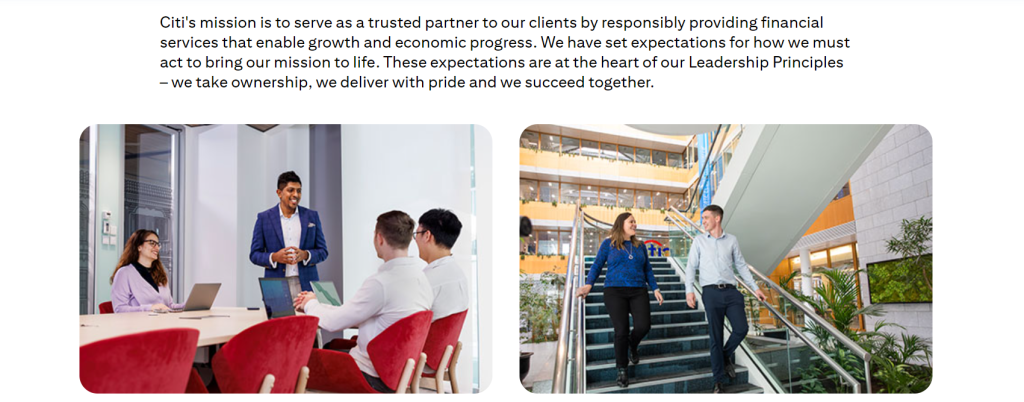Table of Contents
ToggleTable of Contents
A Brief History of Citigroup
Citigroup Inc. is one of the largest financial services companies in the world, with a history that dates back to the early 1800s. The company’s origins can be traced to the founding of the City Bank of New York in 1812, which later became the First National City Bank of New York. Over the years, the bank expanded its operations and services, including international banking, and became known for its innovative financial products and services.
In 1998, Citicorp and Travelers Group merged to form Citigroup Inc., creating one of the largest financial services companies in the world. This merger was one of the first of its kind between a bank and an insurance company, and it marked a significant turning point in the financial industry. The new company offered a wide range of financial services, including banking, insurance, and investment services, and it quickly became a major player in the global financial markets.
In the early 2000s, Citigroup continued to expand its operations through a series of acquisitions and mergers, further solidifying its position as a leading financial services company. However, the company faced significant challenges during the 2008 financial crisis and had to be bailed out by the U.S. government to avoid collapse. In the aftermath of the crisis, Citigroup underwent a major restructuring and refocusing of its business, leading to a more stable and sustainable financial position.
Today, Citigroup Inc. is a global financial services company with operations in over 160 countries and serves millions of customers worldwide. The company continues to be a major player in the banking and financial industry, offering a wide range of products and services to individuals, businesses, and institutions.
Who Owns Citigroup?
Citigroup Inc. is a multinational investment banking and financial services corporation, with a diverse group of shareholders. The largest shareholders of Citigroup Inc. are typically institutional investors such as mutual funds, pension funds, and insurance companies. The largest individual shareholders of Citigroup Inc. include top executives and board members of the company. As of the most recent data available, the top 10 shareholders of Citigroup Inc. are The Vanguard Group, BlackRock Inc., State Street Corporation, SSgA Funds Management Inc., Capital Research & Management Co., Wellington Management Company, Geode Capital Management, Northern Trust Corporation, JPMorgan Chase & Co., and Bank of America Corporation. These institutions and individuals collectively own a significant portion of Citigroup Inc. and have a vested interest in the company’s performance and success.
Citigroup Mission Statement

Citigroup Inc.’s mission statement is to serve as a trusted partner to its clients by providing financial solutions that enable growth and progress. The company aims to be at the forefront of innovation and to use its global network and expertise to create value for its customers, shareholders, and the communities it serves. Citigroup Inc. is committed to fostering a culture of integrity, accountability, and diversity, and to making a positive impact on the world.
How Citigroup Makes Money?
Citigroup Inc. operates as a financial services corporation that generates revenue through a variety of business segments, including consumer banking, corporate banking, and institutional client groups. The company makes money through interest income on loans and mortgages, fees from investment banking and advisory services, and revenue from its global consumer banking and institutional clients group. Citigroup also generates income through its global wealth management and global markets segments, which include trading and sales activities in areas such as equities, fixed income and currencies. Additionally, the company earns revenue through its branded credit card and retail services. Overall, Citigroup’s diverse revenue streams contribute to its strong financial performance and position as one of the world’s leading financial institutions.
Citigroup Business Model Canvas
The Business Model Canvas is a strategic management tool that allows businesses to visualize, assess, and plan their business model. It is a one-page framework that outlines key aspects of a business, including its customers, value propositions, channels, relationships, revenue streams, resources, activities, partners, and cost structure.
1. Customer Segments:
– Corporate and institutional clients
– Individual consumers
– Government entities
– Small and mid-sized businesses
2. Value Propositions:
– Diverse financial products and services
– Global presence and reach
– Integrated banking solutions
– Expertise in various financial sectors
3. Channels:
– Branches and ATMs
– Online banking platforms
– Mobile banking apps
– Contact centers
4. Customer Relationships:
– Personalized relationship management
– Customer service and support
– Financial advice and consulting
– Digital and self-service options
5. Revenue Streams:
– Interest and dividends from loans and investments
– Fees from financial products and transactions
– Wealth management and advisory services
– Cross-selling and upselling opportunities
6. Key Resources:
– Financial data and technology infrastructure
– Skilled workforce and talent pool
– Brand reputation and customer trust
– Regulatory and compliance resources
7. Key Activities:
– Banking and financial services operations
– Risk management and compliance
– Marketing and customer acquisition
– Innovation and technology development
8. Key Partners:
– Vendor and technology partners
– Regulatory and compliance partners
– Strategic alliances and joint ventures
– Affinity and co-branding partnerships
9. Cost Structure:
– Operating expenses for branches and infrastructure
– Employee salaries and benefits
– Marketing and advertising costs
– Technology and innovation investments
Citigroup’s Competitors
Citigroup Inc. operates as a diversified financial services company worldwide. It provides a range of financial products and services, including consumer banking, corporate and investment banking, securities brokerage, wealth management, and institutional clients. Citigroup’s top competitors in the financial services industry include JPMorgan Chase & Co., Bank of America Corporation, Wells Fargo & Co., Goldman Sachs Group Inc., and Morgan Stanley. These companies offer similar services and compete with Citigroup for market share and customer loyalty.
Citigroup SWOT Analysis
Strengths:
1. Global presence with operations in over 160 countries
2. Diversified business model with a focus on commercial banking, consumer banking, and institutional client group
3. Strong brand recognition and reputation
4. Robust technology infrastructure for online and mobile banking
5. Strong capital position and liquidity
Weaknesses:
1. Overdependence on the US market
2. Regulatory and compliance challenges
3. Exposure to market risks and economic downturns
4. Limited focus on wealth management compared to competitors
5. Historical involvement in scandals and legal issues
Opportunities:
1. Expansion into emerging markets
2. Growing demand for digital banking and FinTech partnerships
3. Potential for acquisitions to strengthen market position
4. Growth in consumer and small business lending
5. Increasing demand for sustainable and socially responsible investing options
Threats:
1. Intense competition from traditional banks and FinTech companies
2. Economic and geopolitical uncertainty
3. Regulatory changes and compliance costs
4. Rapidly evolving technology and cybersecurity threats
5. Potential for reputational damage from controversies or scandals
Concluding Analysis
In summary, Citigroup Inc. has a solid business model with a diversified range of products and services that cater to a global market. The company’s focus on digital transformation and risk management has positioned them well for future growth and success. As an analyst, I am optimistic about Citigroup’s future prospects in the banking industry. With continued innovation and a strong commitment to customer satisfaction, I believe that Citigroup will continue to thrive in the ever-evolving financial landscape.
Additional Resources
To keep learning and advancing your career, we highly recommend these additional resources:
Business Model Canvas of The Top 1,000 Largest Companies by Market Cap in 2024
A List of 1000 Venture Capital Firms & Investors with LinkedIn Profiles
Peter Thiel and the 16 Unicorns: The Legacy of Thiel Fellowship












